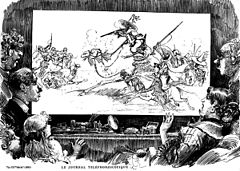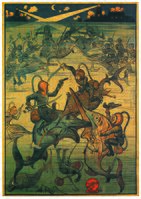Albert Robida
Albert Robida (born March 14, 1848 in Compiègne , † October 11, 1926 in Neuilly-sur-Seine ) was a French writer , draftsman , painter , caricaturist and journalist .
Life
The son of a carpenter first studied law in order to be able to become a notary, but out of boredom he devoted himself to his studies of caricature . In 1866 he published his first drawings in Le Journal amusant , and further work followed. In 1880 he founded his own magazine, La Caricature , together with publisher George Decaux , which he directed for the next twelve years. Under his leadership, Caran d'Ache , Louis Morin , Ferdinand Bac , Job and Maurice Radiguet ( Raymond Radiguet's father ) first became known to a larger audience. He illustrated tourist guides, popular historical works, and literary classics including Villon , Rabelais , Cervantes , Swift , Shakespeare , Balzac, and Arabian Nights . He also wrote a story about the lupanar .
After the First World War, Robida is increasingly forgotten. His fame today is due to a trilogy of early science fiction novels, for which he is now placed on a par with Jules Verne : Le Vingtième Siècle (1883), La Guerre au vingtième siècle (1887) and Le Vingtième Siècle. La vie électrique (1890).
In contrast to Verne, who always emphasizes the exceptional and adventurous character of new technical inventions, she portrays Robida as part of everyday bourgeois life and tries to anticipate their consequences on society, which he often succeeds in with amazing accuracy: that's what he said Equality for women (whom he described as the bearer of active and passive suffrage, as wearing trousers, smoking, as doctors and lawyers), mass tourism and environmental pollution. In his comic book La Guerre au vingtième siècle, campagne de Jujubie , published in 1869 , he sees the great wars of the next century as determined by missiles and chemical warfare agents. With the “telephonoscope”, a screen that broadcasts the latest news but can also be used for telephone conferences, he also anticipates modern media technology.
In 1919 Robida said about the people of the future: They will spend their everyday life in the gears of a totally mechanized world to the extent that I wonder how they can still enjoy the simplest pleasures that are available to us: silence and solitude . But since they will not have known any of this at all, they will not miss it either.
gallery
literature
- Franz Rottensteiner : The future of the fin de siècle. Albert Robidas twentieth century. In: Klaus Burmeister and Karlheinz Steinmüller (eds.): Forays into the day after tomorrow. Science fiction and futurology. Beltz, Weinheim and Basel 1992, pp. 81–94, ISBN 3-407-85306-8 .
Web links
- Literature by and about Albert Robida in the catalog of the German National Library
- Albert Robida in the Internet Speculative Fiction Database (English)
- Works by and about Albert Robida at Open Library
- Homepage of the Association des Amis d'Albert Robida
- La Vie Électrique ( Memento of March 4, 2016 in the Internet Archive ) on Projekt Gutenberg .org
Individual evidence
| personal data | |
|---|---|
| SURNAME | Robida, Albert |
| BRIEF DESCRIPTION | French writer, draftsman, painter, caricaturist and journalist |
| DATE OF BIRTH | March 14, 1848 |
| PLACE OF BIRTH | Compiègne |
| DATE OF DEATH | October 11, 1926 |
| Place of death | Neuilly-sur-Seine |





